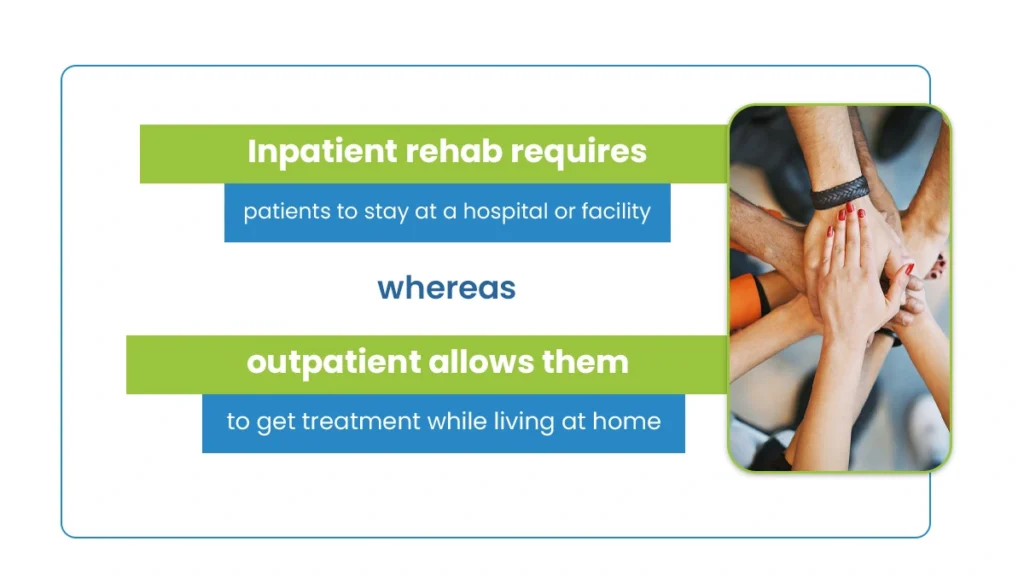When it comes to seeking treatment for drug and alcohol withdrawal, one important decision to make is whether to opt for inpatient or outpatient rehab. Both options offer advantages and considerations, depending on the individual’s needs and circumstances.

Inpatient detox provides a structured and immersive environment where individuals reside within a facility and receive round-the-clock care. On the other hand, outpatient detox allows individuals to receive treatment while living at home and maintaining their daily routines.
This article explores the differences between inpatient and outpatient rehab, helping individuals decide the optimal environment for their drug and alcohol withdrawal. If you want effective inpatient treatment, consider one of the best rehab centers in the United States, The Haven Detox-South Florida.
Key Takeaways
Making the right decision between inpatient and outpatient rehab can significantly impact your recovery journey. Consider the following key takeaways to guide you in your decision-making process:
- Inpatient rehab offers a 24/7 supportive environment with intensive care and structured therapy sessions.
- Inpatient rehab is ideal for individuals with severe addictions or co-occurring mental health disorders. Outpatient rehab provides flexibility for patients to maintain everyday responsibilities.
- Always discuss your situation with a healthcare professional to determine the best course for your recovery.
If you want an effective inpatient treatment program, consider The Haven Detox-South Florida. Contact us now at (561) 328-8627.
Primary Differences Between Inpatient and Outpatient Rehab
Inpatient and outpatient rehab programs offer varying levels of support for people struggling with substance abuse and drug addictions.
In an inpatient treatment program, patients stay full-time at a residential treatment facility, receiving 24/7 care. This long-term, immersive care is beneficial for those with severe addictions. Inpatient programs typically last 30, 60, or 90 days and provide a structured environment away from triggers.
On the other hand, outpatient treatment allows patients to live at home and visit the treatment facility for scheduled sessions. Outpatient care can range from intensive day treatment to less demanding programs. The flexibility of an outpatient program helps those who need to balance rehab with their daily responsibilities.
Inpatient and outpatient rehab are essential, and the choice depends on individual needs. Always seek professional help to decide the most suitable approach for you.
Pros of Inpatient Rehab
Inpatient rehabilitation has several advantages. When choosing a rehab program, this type of treatment can be the best option for many, given its unique features:
Intensive Care: Inpatient facilities provide round-the-clock medical care from dedicated medical professionals. This immediate availability is crucial during the medical detox phase, where patients can experience severe withdrawal symptoms.
Therapeutic Environment: An inpatient rehab facility offers a substance-free environment, minimizing the risk of relapse during the treatment.
Structured Programs: The highly structured treatment program includes therapy sessions, physical therapy, and group therapy. This approach keeps patients focused and occupied, reducing the risk of dwelling on substance use disorders.
Peer Support: Group therapy offers a unique opportunity for patients to connect with others experiencing similar struggles, fostering a supportive community during addiction recovery.
Family Involvement: Many inpatient rehab centers offer family therapy sessions involving family members in the treatment plan. This helps to heal any family issues related to addiction and supports a healthier home environment post-treatment.
Cons of Inpatient Rehab
Despite its advantages, inpatient rehabilitation may not be the ideal choice for everyone. Here are some potential drawbacks to consider:
Time Commitment: One main difference between inpatient and outpatient treatment programs is the time commitment. The fact is, an inpatient program requires a significant time dedication, often 30-90 days. This can interfere with work or other responsibilities.
Cost: Inpatient treatment is often more expensive due to the comprehensive services provided, including accommodation, therapy sessions, and medical care.
Limited Outside Contact: Patients typically have limited contact with family and friends during treatment, which may feel isolating for some.
Transition Post-Treatment: Post-treatment adjustment can be challenging. After leaving the highly structured environment of the rehab center, patients may struggle to adapt to their new routines.
Deciding on the type of program to opt for should always be done considering the individual needs and the severity of the addiction.
Pros of Outpatient Rehab
Outpatient rehab offers numerous benefits and can be the right kind of treatment for individuals with different needs:
Flexibility: The outpatient option allows patients to continue with everyday responsibilities like work, school, or family obligations while attending scheduled treatment sessions.
Affordability: Outpatient substance abuse treatment is typically less expensive than inpatient rehab. This is because patients don’t incur costs for room and board.
Family and Community Support: Outpatient services allow for more frequent interactions with family and friends, fostering a supportive environment for recovery.
Practical Learning: Treatment options, including counseling and behavioral therapy, provide practical skills that patients can immediately apply in their everyday life, reinforcing their recovery plan.
Variety of Services: From regular counseling to intensive outpatient programs, outpatient rehab provides various services to meet varying patient needs.
Cons of Outpatient Rehab
While outpatient rehab is an excellent choice for many, there are potential disadvantages that need to be considered:
Exposure to Triggers: Unlike inpatient rehab, outpatient services can’t entirely shield patients from their typical environment, which may contain triggers that could jeopardize recovery.
Dependence on Self-Discipline: Success in outpatient rehab requires a high degree of commitment and self-discipline from the patient, as the temptation to relapse can be stronger without 24/7 supervision.
Limited Medical Support: Outpatient programs may lack immediate medical advice or support, which can be crucial for individuals with co-occurring disorders like bipolar disorder.
Less Structured: Outpatient rehab is less structured than inpatient treatment. For some, this could lead to a need for more focus on recovery.
Less Time with Health Care Providers: With outpatient care, patients may have less direct time with health care providers, potentially limiting their ability to address all aspects of their condition effectively.
In conclusion, the best choice depends on the individual’s unique needs, conditions, and circumstances.
Making the Decision: Which Option is Best for You
Choosing between an inpatient and outpatient addiction treatment program is a critical step in your journey to recovery. Consider the following aspects:
Severity and Duration of Addiction
If you’re dealing with a severe or long-term substance use disorder, such as chronic alcohol or drug abuse, inpatient rehab programs can be a powerful tool. Residential treatment programs provide a safe space, intensive care, and constant support to help you manage withdrawal symptoms.
Availability of Support Networks
A strong support group can greatly contribute to the recovery. If you have a solid network at home, outpatient therapy might work well for you. However, a residential program offers structured support and group therapy that can be beneficial if your home environment is less supportive.
Cost of Treatment
An important consideration is the cost. Outpatient rehab tends to be less expensive due to the lack of accommodation costs associated with residential rehab.
Outside Commitments
If you have work or family responsibilities, an outpatient rehabilitation program offers the flexibility to continue your commitments while receiving the needed care.
Co-Occurring Mental Health Disorders
An inpatient recovery program might be the best treatment option for dealing with psychiatric disorders alongside substance use. This is due to the comprehensive care and availability of specialized therapies, like speech therapy, for co-occurring conditions.
Decision Between You and Your Doctor
The goal is to choose the most effective treatment for your unique situation. Discussing your condition, lifestyle, and preferences with a healthcare professional is important. The length of stay, the intensity of the addiction, mental health issues, and your commitment all factor into the decision of inpatient vs. outpatient care.
Making the right choice is important in ensuring your success in recovering from substance abuse or alcohol addiction. Always remember, whether it’s short-term outpatient therapy or a longer stay in a residential program, the best treatment is the one that meets your individual needs.
Frequently Asked Questions (FAQ)
What is an inpatient and outpatient treatment program?
Inpatient and outpatient treatment programs are two distinct approaches to addiction recovery. Inpatient treatment involves residential care, where individuals stay at a treatment facility 24/7 for a designated period. It offers intensive, round-the-clock support, structured therapies, and a controlled environment to focus solely on recovery.
Outpatient treatment, on the other hand, allows individuals to live at home while attending therapy sessions at scheduled times. It provides flexibility, allowing individuals to continue with daily responsibilities. Both programs address substance abuse, provide counseling and support, and equip individuals with essential tools for long-term sobriety.
What is inpatient rehab treatment like?
Inpatient rehab is a comprehensive, immersive program that addresses addiction and facilitates recovery. Individuals reside at a treatment facility for a specific duration, typically from a few weeks to several months. It offers a structured and supportive environment, 24/7 supervision, and a range of therapies.
Inpatient rehab provides intensive counseling, medical care, detoxification if needed, and a variety of evidence-based treatments tailored to individual needs. It focuses on breaking addictive patterns, developing coping skills, and fostering personal growth, setting the foundation for lasting recovery.
How long does inpatient drug rehab treatment usually last?
The duration of inpatient drug rehab treatment can vary depending on several factors, including the severity of addiction, individual progress, and specific program guidelines.
Generally, inpatient rehab programs last anywhere from 28 to 90 days or more. Shorter programs may provide a focused and intensive approach, while longer programs offer more extensive treatment and aftercare planning.
The length of stay is determined through initial assessments, ongoing evaluations, and collaborative decisions between the individual and treatment professionals to ensure the most effective and appropriate duration for recovery.
Begin Your Path to Sobriety with The Haven Detox-South Florida
Embark on your journey towards sobriety with The Haven Detox-South Florida. Our expert team is dedicated to providing comprehensive and personalized services to help you overcome addiction. Get benefits from our state-of-the-art facilities and amenities, ensuring a comfortable and supportive environment throughout detoxification.
Our treatment programs include inpatient and detoxification. Our highly trained medical professionals will guide you through every step, offering individualized care and treatment plans tailored to your needs.Choose The Haven Detox-South Florida as your partner in recovery. Take the first step today and reclaim your life from stress and addiction. Contact us at (561) 328-8627.






